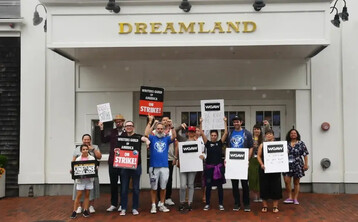Donick Cary Brings WGA Strike To Nantucket
JohnCarl McGrady •

The Writers’ Guild of America strike has come to Nantucket. The island may not have any ongoing productions to shut down or studio headquarters to barricade, but that hasn’t deterred strike organizer and Emmy winner Donick Cary.
“It really is for awareness first,” he said. “It’s about getting the word out.”
When it comes to raising awareness, being on Nantucket might actually be an asset. Another few people on the picket line in New York City isn’t going to make that much of a difference, but spreading the protest to a vacation town? That gets attention.
And the members of the WGA, who have been striking for months amidst falling pay and the rise of generative artificial intelligence, need attention if they want to force studios back to the negotiating table.
The island’s WGA strike has already received a write-up in Indiewire, during the Nantucket Film Festival—which actively encouraged writers to form a picket line—and coverage of the strike was retweeted by the official account of the eastern branch of the union.
If Cary can entice a big-name celebrity to the picket line, he might be able to garner even more attention. He has his eyes on a few prominent WGA members who vacation on the island, including Donald Glover and Sylvester Stallone. It’s Stallone who Cary wants most.
“We’d love him to join us. We’ll come to him and march out to a restaurant with him and get coffee,” said Cary, who has written for everything from The Simpsons to Parks and Recreation. “If he would come, I would get the Dreamland to let me watch every Rocky movie in the franchise in one sitting.”
“Consider it a challenge,” he said. “The gauntlet is thrown.”

It’s not just about awareness, though. It’s also about solidarity.
“I love coming to Nantucket, I want to be here, I want to take a break from work, it’s about balance and stuff,” said Cary, who grew up on the island. “But I also want to tell [other WGA members] we’re getting out there too, we’re with you.”
That solidarity is more important than ever as writers fight for their livelihoods.
“Over the last 10 to 15 years, the average income [for writers] has pretty steadily gone down while the revenue of the [production] companies has pretty steadily gone up,” Cary said.
In part, this is because streaming companies don’t pay residuals to writers when people watch their shows. Cary wrote a Netflix film, so he’s seen this first-hand.
“I don’t know how many millions of people have watched it, it doesn’t matter. I don’t get a cent,” he said.
Other WGA concerns include reduced episode count for most shows and slower rates of promotion. Getting the studios to negotiate further will require serious external pressure, pressure Cary wants to help provide.
“For me, it's personal in that both of my kids are writing stories, and they want to be storytellers,” he said.
At times, Cary has had as many as 25 people join him in his daily walks around town, carrying signs and answering questions from curious onlookers, but he’s just as happy when it’s only him and a couple of friends.
“We’re not trying to shut something down, so it’s not even so much that we need masses of people that can stop a truck,” he said.

Still, he’s always looking for more people to join him—and you don’t have to be a WGA member to join the protest.
“We welcome everyone,” he said. “Every time I’ve been out on strike, I’ve met someone new, I’ve had an amazing conversation. I love this community, I love the people I work with.”
In fact, Cary has a whole schedule to encourage people to join him. Today, for instance, is Chadtucket Day. He and his fellow strikers, dressed in the preppiest clothes they can find, are going to march to every ice cream store they can and do taste tests of the product. There are also days dedicated to actors, theater camps, Mr. Rogers, and the dual premiere of Barbie and Oppenheimer. A full schedule is available on Cary’s Instagram.
But the biggest day he is planning is probably July 20th. On that day, Cary encourages members of all local unions—regardless of their current contractual status—to join him at the rotary and show their solidarity. Sometimes, he says, people forget just how many people are union members. He wants to remind them.